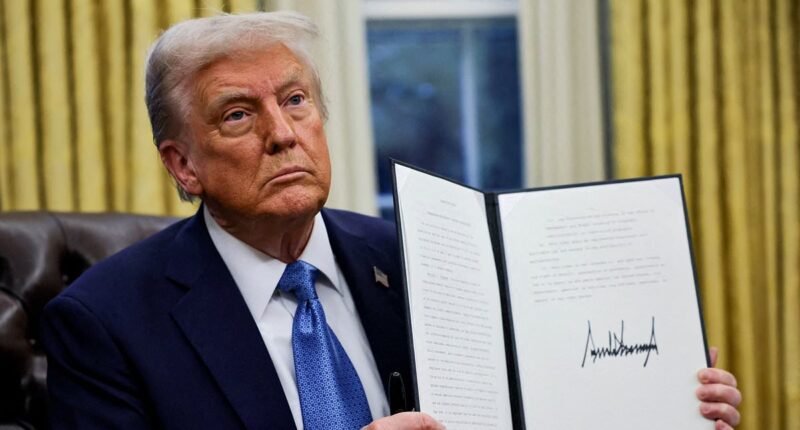President Donald Trump’s supporters are divided on his approach to tariffs, which involve imposing harsh taxes on goods like steel and aluminum, as well as other import duties to generate income for the country.
Trump has been on a tariff kick and has plans for more. He said he will announce reciprocal tariffs against all nations on Tuesday or Wednesday.
Reciprocal tariffs would impose import taxes on products where another country has levied duties on U.S. goods.
‘Very simple, they charge us, we charge them,’ Trump said Sunday. ‘Tariffs are going to help. Tariffs are going to make it very successful.’
Trump is considering implementing universal tariffs ranging from 10% to 20% on almost all imports to increase revenue and help balance out the tax cuts proposed by Republicans.
He told Fox News his plan will make America ‘rich.’
‘We are going to prosper – and currently, we are not as prosperous as we should be. We have a debt of $36 trillion. This is because we have allowed many countries to exploit us.’
‘Same thing, like $200 billion with Canada. We owe $300 – we have a deficit with Mexico of $350 billion. I’m not going to do that. I’m not going to let that happen,’ Trump told Fox News’ Bret Baier.
But some Congressional Republicans are raising questions about the president’s plan to raise revenue.

President Donald Trump has been on a tariff kick with more import taxes to come
The lawmakers worry the tariffs won’t raise the kind of funds that Trump claims.
‘I’ve heard figures of almost $1 trillion in revenue or replacing the income tax, and I’m just not seeing it,’ Republican Sen. Ron Johnson of Wisconsin said last week.
Republican Senate Majority Leader John Thune also has worries.
‘I’m not a big fan of across-the-board, universal uniform tariffs because in some cases of the impact it has on the ag community, which is critical to our state,’ Thune, who represents the agriculture-rich South Dakota, said last week.
He noted that the level of tariffs Trump may impose ‘remains to be seen.’
Tariffs are coming much earlier in Trump’s presidency than during his previous four years in the White House, when he prioritized tax cuts and deregulation.
The president has alternately said he sees import taxes as tools to force concessions on issues such as immigration but also as a source of revenue to help close the government’s budget deficit.
Trump on Sunday did not offer any details about the steel and aluminum duties or the reciprocal tariffs.
Previously he’s said the U.S. should impose tariffs on computer chips, pharmaceuticals, copper, oil and gas imports.
Trump has a mixed record when it comes to enforcing his tariffs.
He delayed his threat to put a 25% import taxes on all goods from Canada and Mexico.
But he kept his 10% duties on imports from China.

‘I’ve heard figures of almost $1 trillion in revenue or replacing the income tax, and I’m just not seeing it,’ Republican Sen. Ron Johnson of Wisconsin said, raising concern Trump’s tariffs won’t raise the money he wants

Ursula von der Leyen, the president of the European Union’s executive arm, (above) is set to meet with Vice President JD Vance in Paris on Tuesday
Additionally, Trump allies warn that the European Union and South Korea will also see tariffs because of taxes, regulations and penalties they have imposed on U.S. tech companies such as Google.
‘I think Europe is in for a massive trade war,’ Robert O’Brien, Trump’s first-term national security adviser, told the Wall Street Journal. ‘I do not believe the president is going to put up with this type of action against America’s biggest companies.’
Trump has long complained that the U.S. buys more from the EU than it sells to it, and said last week tariffs on the EU ‘will definitely happen.’
The European Commission on Monday said it would react if Trump went through with his threat to slap 25 percent tariffs on steel and aluminum, slamming them as ‘unlawful’ and ‘counterproductive.’
‘By imposing tariffs, the U.S. would be taxing its own citizens, raising costs for business, and fueling inflation. Moreover, tariffs heighten economic uncertainty and disrupt the efficiency and integration of global markets,’ the Commission said.
And German Chancellor Olaf Scholz said the EU can act ‘within an hour’ if Trump makes good on his tariff promises.
Ursula von der Leyen, the president of the European Union’s executive arm, is set to meet with Vice President JD Vance in Paris on Tuesday to discuss the issue.
She has said repeatedly that a trade war would cost both economies dearly and that Europe stands ready to negotiate to avoid one.
The bulk of U.S. steel and aluminum imports come from Mexico and Canada, leaving those two countries mostly at risk of Trump’s imposition of the 25 percent levy.
But Trump’s threat of reciprocal tariffs also has Europe worried.
Those would target specific industries, including the EU’s auto industry as well as its agriculture and pharmaceutical sectors.
In some categories, European tariffs are notably steeper than the American counterpart: 10 percent compared with 2.5 percent for U.S. automobiles, for example.
Trump argues his plan is only fair.
‘If they are charging us 130% and we´re charging them nothing, it´s not going to stay that way,’ he said.

















